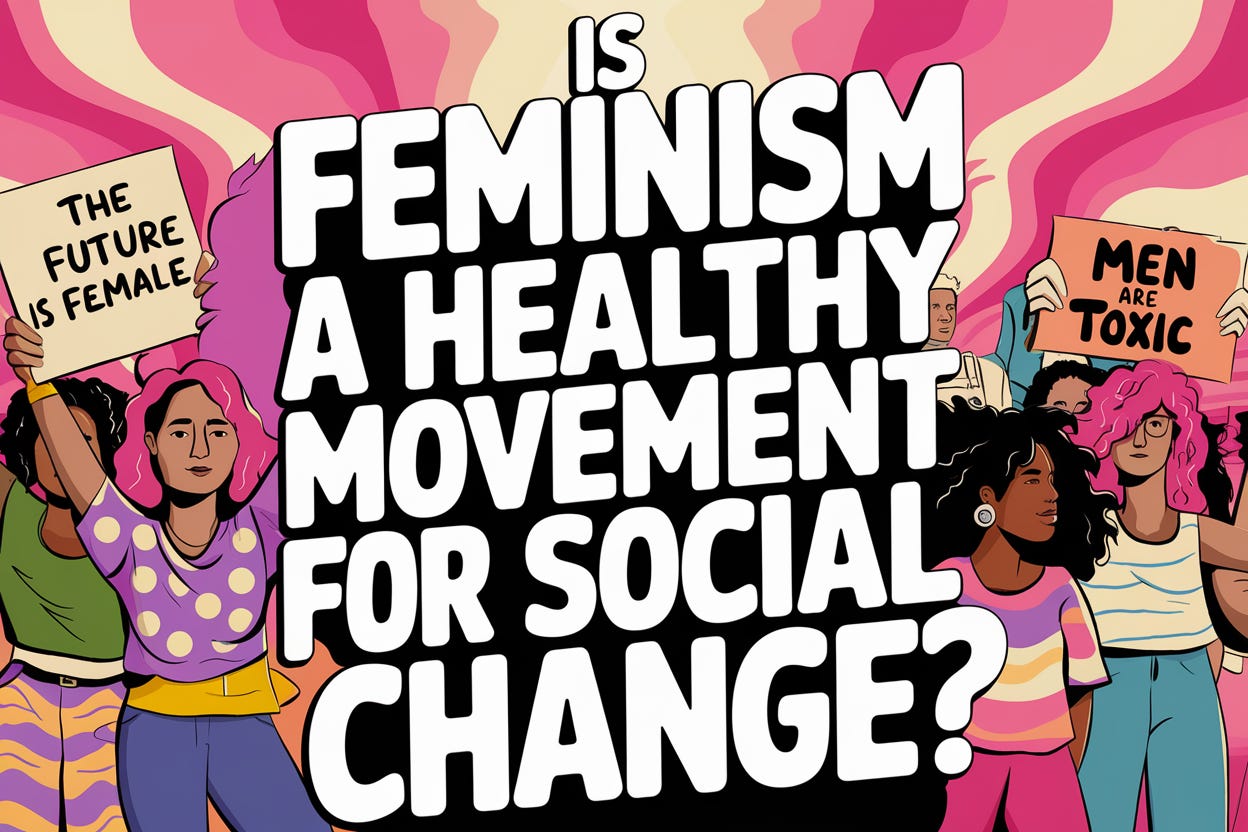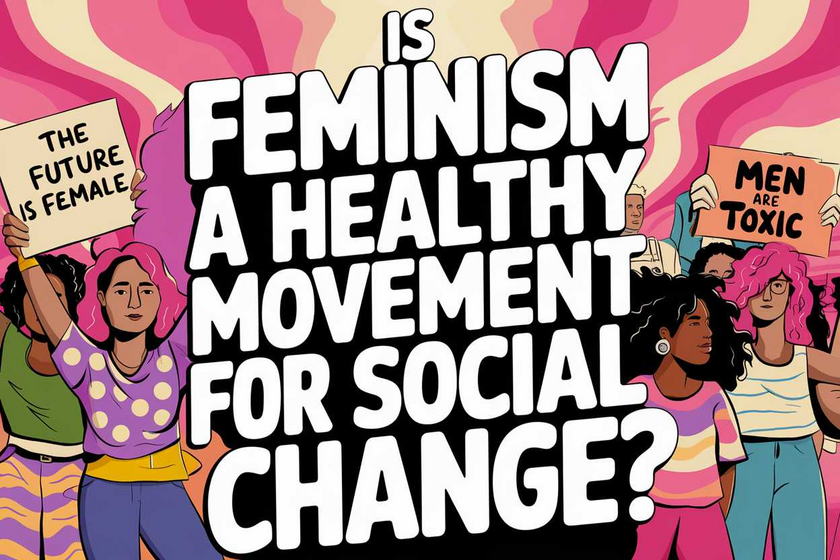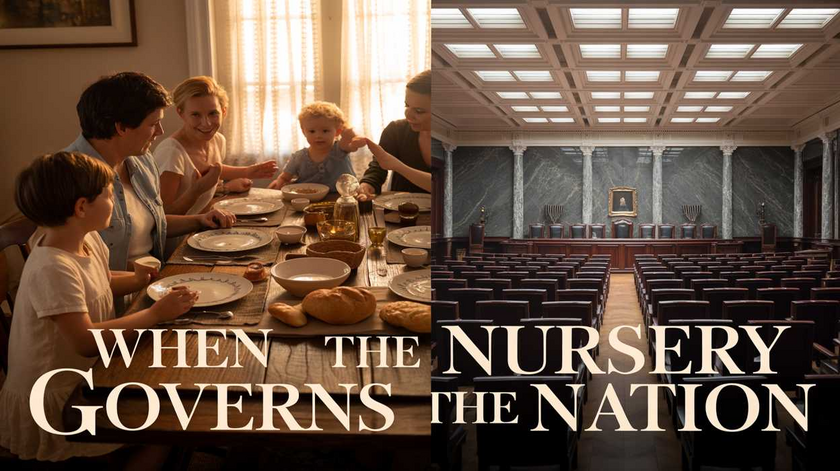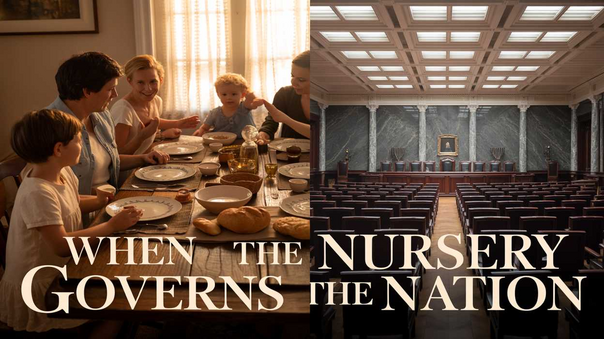Is Feminism a Healthy Movement for Social Change?

Thank you for asking this question about the nature of feminism. Confusion about this is universal and embedded in our culture. Even your short paragraph below reveals some of this confusion, when you write, "I would like to hear how you all would define feminism vs working for women's rights back in the 60s and 70s. Even back then there was debate about who was a feminist and who was not...but still working for equal rights." You use the phrases "working for women's rights" and "working for equal rights" interchangeably, as if they are and were the same thing. But they are not, and were not. I will explain.
In this explanation, I will use "feminism" as synonymous with "the women's movement," because at the level of analysis that I am proposing here, there is no difference.
First we will consider the difference between positive and healthy movements for social change and those that have pathology built into them. And then we will consider an error of judgment that is built into feminism specifically, at the level of its founding analysis.
For an example of a healthy movement for social change, consider the movement for racial equality led by Dr. Martin Luther King, Jr. in the 1960s. It was founded on a vision of racial equality (see his "I Have a Dream" speech for a clear exposition of this vision), and it was collaborative, meaning that he welcomed whites and blacks as equal participants in the movement (see his "Letter from a Birmingham Jail" for evidence of this). No one was stigmatized for past wrongs; all were invited to share the vision and to collaborate in working towards it. This is the essence of a healthy movement - it focuses on a positive vision of a desired future rather than a moral judgment of a dysfunctional past and present, and it invites collaboration from all as equals rather than dividing the world up into guilty oppressors and innocent victims.
There is no doubt that blacks WERE oppressed historically by whites - slavery and, more recently, legal segregation were evidence of that, and the hundred years or more of public lynchings are irrefutable evidence. Yet, King saw no need for moral judgment and stigmatization of whites for this history. For him, all who shared the vision of equality were equal and were welcomed into the movement. What mattered was what people wanted, not their past, their ancestors or their skin.
And then he was assassinated.
We have not had a single healthy mainstream identity movement since that time. All, including feminism/the women's movement and all of the movements for racial equality, culminating in the Woke movements of today, have been founded on a moral dichotomy, a dividing of the world into guilty oppressors/perpetrators and innocent victims, a division built not on behavior but on identity. This founding analysis builds moral inequality in at the movement foundations; since victims are morally innocent and oppressors are guilty, the purported vision of equality is rendered unobtainable, forever out of reach. What equality can exist between oppressors and victims? Such movements are pathological and that is why, despite all of the equality legislation and the trillions of dollars spent on amelioration programs, we still hear constantly that equality remains far away.
I want to be clear about something. My purpose here is not moral judgment, but clear description. I use the term "pathological" as a term of ill health rather than moral judgment. Such movements cannot work, where "work" means actually achieve their claimed objectives. They are literally dysfunctional, they do not function to seek equality, and they never did. The founding analysis of moral division by identity defeated them from the start. Such movements are populated by many who sincerely seek positive change, but until the seductive story of moral superiority (for designated victims) is repudiated, they will continue to fail and leave various kinds of devastation in their wake.
Feminism/the women's movement has always embraced this destructive story of victimhood for women, but this movement suffers from an additional error - in their case, it isn't actually true. It isn't true that men as a group have oppressed women as a group - ever. What men and women have suffered historically is the effects of gender roles, roles that were enforced not by men but by biology. Biological differences, principally reproductive differences, between men and women resulted naturally and inevitably in women being ascribed the role of child-raiser and homemaker, and men the role of provider and protector. Nothing else would work when women were obliged to have multiple children (since many of them died). Life was tough, and evolution selected for what worked, as it always does.
For proof that the relationship of women and men isn't one of oppression, consider the survival numbers from the Titanic. First and second class, who had access to the lifeboats (unlike the "steerage" third class passengers who were locked below decks) numbers are as follows: Children, 100%. Women, 93%. Men, 22%. The richest man in the world was on that ship, and he went down with it. His wife and his wife's maid were saved. Now, what do we have here? When the stakes are the very highest, when only some can be saved and some must die, who gets prioritized? Not men. This, if one is honest, is proof absolute that men do not oppress women. Oppressors do not give their lives to save the oppressed. Never in history has this occurred. The notion is ridiculous. Consider the slave ships with blacks chained in their holds - that was real oppression. If one of those ships foundered, do you think the crew would give their lives to save the slaves? Of course not.
It only takes a single counterexample to disprove a general rule. If I say, "All swans are white," you have only to point out a single black swan to prove me wrong. The Titanic is just one example (there are many) that disproves the general statement that men oppress women. That is not the relationship that pertained in 1912 when the Titanic sank, long before feminism went mainstream in the 1960s, and it is not the relationship that pertained throughout history. And so feminism is not only an unhealthy movement founded on a story of moral superiority/inferiority. In its case, that very analysis is a lie.
I do not claim that it is an intentional lie. For most, I believe that it is sincerely believed. Nevertheless, it is mistaken and should be corrected, because it is doing great harm, both to women and to men.
To return, at last, to the question that started this all, which is whether feminism is responsible for boy's and men's problems, the answer is yes, in part. The moral stigmatization of men and boys that is the result of the founding analysis that men oppressed women is indeed the responsibility of feminism, which is revealed as a movement of female moral chauvinism. But a part of men's and boys' problems is the persisting gender roles (e.g., the male draft) and not the responsibility of feminism/the women's movement.
David Shackleton
____________________________
David Shackleton is a thinker and writer about culture with a focus on identity politics and gender. His books "The Hand That Rocks the World: An Inquiry Into Truth, Power and Gender" and "Daughters of Feminism: Women Supporting Men's Equality" are available on Amazon. His website is genderhealing.com.



















